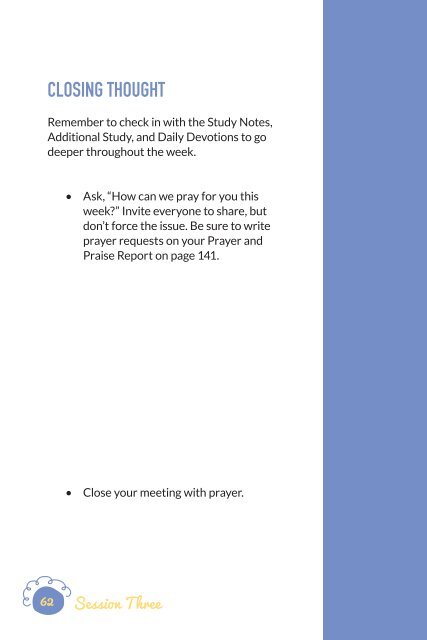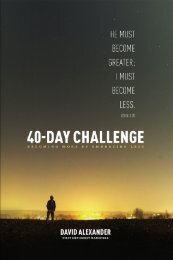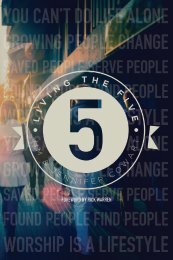Family Matters
Create successful ePaper yourself
Turn your PDF publications into a flip-book with our unique Google optimized e-Paper software.
CLOSING THOUGHT<br />
Remember to check in with the Study Notes,<br />
Additional Study, and Daily Devotions to go<br />
deeper throughout the week.<br />
• Ask, “How can we pray for you this<br />
week?” Invite everyone to share, but<br />
don’t force the issue. Be sure to write<br />
prayer requests on your Prayer and<br />
Praise Report on page 141.<br />
Study Notes<br />
AS STEVE REMARKS IN THE VIDEO, IT’S IMPORTANT<br />
THAT WE TEACH OUR KIDS THE MAJOR LESSONS OF<br />
LIFE BEFORE THEY’RE 18 YEARS OLD. IN OUR CULTURE,<br />
THAT’S THE LEGAL AGE OF ADULTHOOD, SO IT’S<br />
DEFINITELY IMPORTANT THAT WE’VE PARENTED OUR<br />
KIDS TO BE COMPLETELY RESPONSIBLE FOR THEIR<br />
ACTIONS AND TO UNDERSTAND CONSEQUENCES<br />
BEFORE THEY REACH THIS MILESTONE.<br />
However, recent research by human development psychologists,<br />
neurologists, and other specialists shows that while our culture<br />
considers kids “grown” at age 18, the human brain actually<br />
continues to mature and develop until age 25. Here’s a quote<br />
from an article on the subject by National Geographic:<br />
• Close your meeting with prayer.<br />
The first full series of scans of the developing adolescent brain—a<br />
National Institutes of Health (NIH) project that studied over<br />
a hundred young people as they grew up during the 1990s—<br />
showed that our brains undergo a massive reorganization<br />
between our 12th and 25th years. The brain doesn’t actually<br />
grow very much during this period. It has already reached 90<br />
percent of its full size by the time a person is six, and a thickening<br />
skull accounts for most head growth afterward. But as we<br />
move through adolescence, the brain undergoes extensive<br />
remodeling, resembling a network and wiring upgrade……<br />
When this development proceeds normally, we get better at<br />
balancing impulse, desire, goals, self-interest, rules, ethics, and<br />
even altruism, generating behavior that is more complex and,<br />
62 Session Three<br />
Parental Guidance Required • Part Two 63











